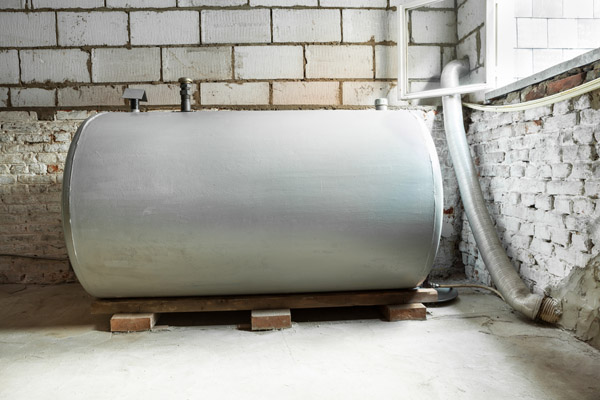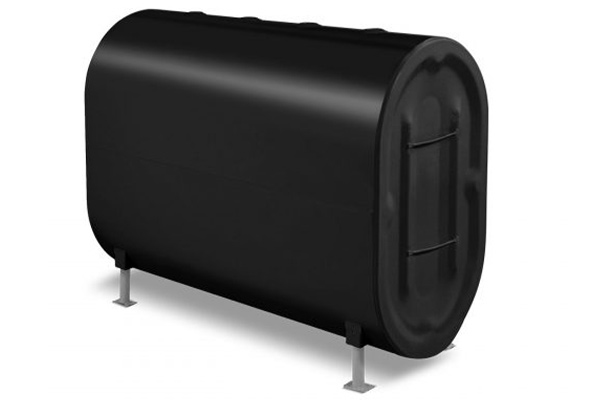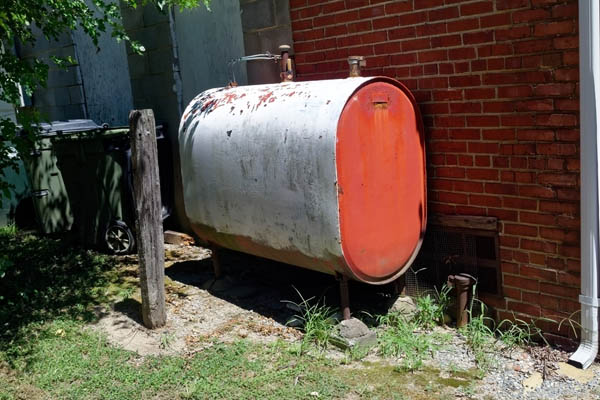
While the process of maintaining an oil tank is quite straightforward, it is vital because it not only improves your home’s energy efficiency but also prevents potential hazards from occurring. Additionally, it extends the lifespan of your oil tank. It is important, therefore, to follow some heating oil tank maintenance tips. In this article, we discuss more information on this topic.
Problems Created By Lack Of Oil Tank Maintenance
Just like any piece of equipment, when you don’t maintain or inspect your oil tank, there are issues that can arise.
- Contaminants: Poorly maintained or corroded fuel oil tanks can allow contaminants to collect in the tank. Once impurities mix with the fuel, the burn process is compromised. It’s important to have clean oil in your tank because, during the burning process, highly pressurized oil is pushed through a narrow nozzle, impurities can compromise combustion and decrease energy efficiency.
- Oil Leaks: Poorly maintained tanks can leak, leading to a messy, time-consuming, and expensive cleaning process, along with health and environmental hazards in your home.
- Bacteria: Fuel tanks are vulnerable to the intrusion of bacteria and water vapor. More specifically, condensed water vapor inside an oil tank creates a suitable environment for bacterial growth. A badly contaminated fuel system may need expensive repair or it may malfunction leading to your heating system going out of service. Microbial growth leads to clogged oil filters, diminished combustion efficiency, and corrosion of fuel tank components.
Choosing A Fuel Oil Tank
 One of the factors that influence the kind of maintenance your tank needs is the type of tank you’re using. Each type of tank comes has its own pros and cons. Whichever type of oil tank you opt for, it should be robustly built and durable, have a capacity that can serve your needs, and shouldn’t raise installation issues.
One of the factors that influence the kind of maintenance your tank needs is the type of tank you’re using. Each type of tank comes has its own pros and cons. Whichever type of oil tank you opt for, it should be robustly built and durable, have a capacity that can serve your needs, and shouldn’t raise installation issues.
Where To Locate Your Heating Oil Tank
Here are a few options:
- Aboveground Indoor Oil Tanks: Generally, these tanks are located in a basement, utility room, or garage. Unlike a standard tank which holds 275 gallons, these tanks have a capacity of between 160 and 400 gallons.
- Aboveground Outdoor Oil Tanks: These tanks are usually located next to the house. They should have a sturdy build that can withstand the elements. But, if not well maintained, an above-ground tank can corrode leading to an accumulation of iron sludge in the tank. This residue of rust can clog the tank’s filters, nozzle, and the opening that channels oil to the burner. The metal legs of a tank, too, can corrode, making them weak.
- Underground Oil Tanks: These tanks are installed underground, but removing them or even finding them can be difficult. On the positive side, these tanks have a larger capacity that ranges from 550 to 1000 gallons.
Oil Tank Maintenance: Steps To Take
Below, we discuss some steps to take if you have a heating oil tank on your property.
1. Check For Leaks
If your tank is installed above the ground, whether indoors or outdoors, you should periodically give it a thorough look-over. Check the tank, vent, and fuel delivery lines, return and supply lines, valves, and each fitting. You should also assess beneath each of these components for any signs of rust or oil accumulation that may signal a malfunction or leak. Although inspecting an underground tank is more difficult compared to an aboveground tank, you should inspect your underground tank periodically for leaks and corrosion. Moreover, you should prepare yourself for the worst-case scenario by getting an oil spill kit that comprises materials like drain blockers, leak-sealing putty, and sorbent material. These will help you mitigate a spill before professionals arrive to deal with the spill.
2. Assess The Support

Check for any signs of cracking, settling, or rusting on the support legs of your above-ground tank. Aboveground oil tanks should sit on a steady surface, ideally on a sturdy concrete pad built on compacted earth. If you notice rust on the legs, cracks on the concrete, or if the ground becomes unstable, you should sort out the issue immediately before it gets out of hand. Indoor tanks too should be placed on a concrete floor.
3. Check For Damage On The Oil Tank
You should also give the oil tank itself a thorough assessment. Look for oil stains, dents, or any indications of tilting or settling. These are all signs of ongoing or future issues.
4. Clean The Tank
You should clean the inside of your oil tank at least once every five years. This averts the buildup of water and sludge, which leads to leaks and corrosion.
5. Ensure Heating Oil Tank Components Are In Working Order
Regularly check if important components of your tank, like gauges and oil tank vent alarms, are working; you should refer to the manufacturers’ instructions. Besides, find where the isolation valve is located in the tank so that you can shut it off in case of a leak or an emergency. If any of your heating system’s components has a problem, you should hire a qualified oil tank technician, like Tevis Energy, to fix the problem.
6. Check For Water Contamination
Wintry weather can cause damage to your oil tank, leading to serious problems. For instance, due to damaged vents, improperly closed filler caps, corroded seals, or even tiny openings on the tank, water may get into the tank. One of the main problems with water contamination is that it’s generally hard to detect because water sinks to the bottom of the tank, which makes it not only difficult to spot, but also remove. To avoid water contamination, ensure lids are secure and check for bulging on the exterior walls, which may indicate weakness. If your tank is properly installed and maintained, it will serve you for a long time. If you suspect an oil spill, report the issue to your local fire department and your oil supplier immediately.
Conclusion
Oil tank maintenance extends tank life, prevents potential hazards such as oil leaks, and improves your home’s energy efficiency.
Contact Tevis Energy For Your Home Heating Oil Needs

Tevis Energy is a trustworthy HVAC company and heating oil delivery company that services central Maryland and southern Pennsylvania. Our company offers affordable and the most competitive heating oil prices in the area. Our goal is to provide you with excellent products and services. When you choose us to be your oil supplier, you can rest easy knowing that you will have correct and prompt heating oil deliveries at the best possible prices. Furthermore, we offer various heating oil delivery plans and financing options, as a way to customize your oil deliveries. Be sure to call us today to learn more.
Tevis Energy has certified and highly trained HVAC technicians to cater to all your heating and cooling needs. We guarantee that each of our techs has the experience, skills, and knowledge to provide excellent HVAC services. Our team can assist you with installations, repairs, maintenance, and much more. Our superior HVAC solutions always come at affordable costs.
Call us today to learn more about the products and services our company offers. We provide free, in-home estimates.
You can click here to contact us now or call us at (410) 876-6800 to find out more!
